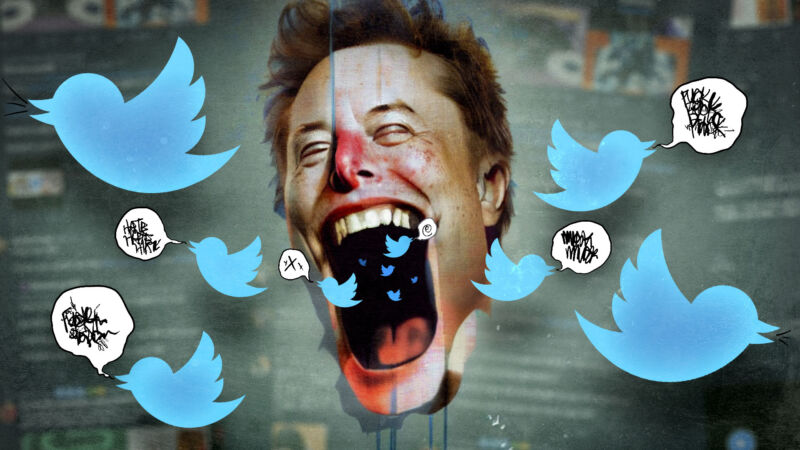Twitter quietly edited its hateful conduct policy to drop transgender protections
Twitter Blue #TwitterBlue


Aurich Lawson | Stable Diffusion
Earlier this month, Twitter quietly removed transgender-specific protections from its hateful conduct policy, drawing criticism from advocates who say there has been a spike in anti-LGBTQ rhetoric since Twitter CEO Elon Musk took over the platform last year.
An archived version of Twitter’s prior policy, dated April 7, clearly stated that Twitter prohibited “targeting others with repeated slurs, tropes or other content that intends to dehumanize, degrade or reinforce negative or harmful stereotypes about a protected category. This includes targeted misgendering or deadnaming of transgender individuals.” (“Deadnaming” refers to calling a trans person by their former name.)
But on April 8, the policy language changed to strike that last line. That edit effectively removed transgender-specific protections that were first implemented in 2018 to address a disproportionate amount of hate speech targeting transgender users, The Verge reported that year.
“This is just one of many moves since Musk’s takeover of Twitter that has made the platform more and more unsafe for LGBTQ people and advertisers,” Sarah Kate Ellis, president and CEO of the Gay & Lesbian Alliance Against Defamation (GLAAD), told Ars.
Ellis told Ars that the policy update is “unacceptable” because of “the barrage of disinformation and hate about trans people from right-wing media personalities, politicians, and the extremists they bolster.” She also said that Twitter’s decision “only further erodes the trust between Twitter and its users and advertisers.”
Yesterday, Musk attempted to woo advertisers—many of which are worried about branded tweets appearing next to hate speech—back to Twitter while also standing his ground on his policy of limiting the reach of some hate speech rather than banning it entirely. While speaking at a Miami Beach marketing conference, Musk said that “he was eager to hear legitimate concerns that advertisers might have about Twitter, but he emphasized that he wouldn’t succumb to pressures to make changes he doesn’t believe in,” The Wall Street Journal reported.
Advertisement
“It’s totally cool to say that you want to have your advertising appear in certain places of Twitter and not in other places,” Musk told conference attendees. “But it is not cool to say what Twitter will do. And if that means losing advertising dollars, we’ll lose them. But freedom of speech is paramount.”
Musk has said that some advertisers have either returned to Twitter or are planning to soon. However, the WSJ reported that third-party data from market intelligence firm Sensor Tower showed that out of 100 top Twitter advertisers, 30 advertisers have spent nothing on Twitter so far this year, and 24 advertisers had reduced their spending on Twitter by 80 percent or more.
Some advertisers told Forbes that they were most concerned about racist tweets, but Kayla Gogarty, the deputy research director for the left-leaning nonprofit Media Matters, authored a study last December showing a significant spike in anti-LGBTQ rhetoric on Twitter since Musk took over.
Gogarty tracked retweets and mentions of nine accounts that frequently use the slur “groomer”—which is commonly used to refer to a right-wing conspiracy theory suggesting that LGBTQ education is used to exploit minors—and documented an increase of over 1,200 percent. Before Musk became CEO, retweets and mentions of these accounts tweeted about “groomers” 3,600 times. After his takeover, the number jumped to 48,000. Gogarty told Ars that Twitter’s rollback of transgender protections “is another reason why advertisers” who don’t want branded tweets next to anti-LGBTQ rhetoric “should be very skeptical” about returning to the platform.
In November 2022, when Musk’s revamped Twitter Blue subscription initially rolled out, digital rights organization the Electronic Frontier Foundation (EFF) reported that there was a “wave of abuse” from “anti-trans trolls, far-right extremists, and conspiracy mongers.” The abuse reportedly contributed to Musk’s decision to pause the Twitter Blue rollout, but Gogarty told Ars that since Twitter Blue has been available again, the blue check now “gives a veneer of credibility” to anti-LGBTQ users who expect that their paid subscription will increase the visibility of anti-LGBTQ posts on the platform. {Update: An EFF spokesperson told Ars, “There are plenty of cynical and troubling conclusions one could imagine about why this change was made to Twitter’s policy text. The reality is that the policy against misgendering and deadnaming was selectively enforced and the CEO himself dabbled in casual transphobia. Watering down hate speech rules and selling blue checks to users who post hate speech with impunity is part of a pattern at Twitter since Elon Musk bought the company, encouraging more hate speech, eroding whatever value the platform still has, and increasing risks for marginalized and targeted groups on the platform.”]
Advertisement
At the marketing conference, Musk promised advertisers that his plan was to achieve a “sensible middle ground” where Twitter remains a “valuable” platform to brands by limiting the reach of hate speech instead of removing it.
“If somebody has something hateful to say, it doesn’t mean you should give them a megaphone,” Musk said. “We’re not going to recommend hateful content to people.”
This month, Twitter also published a blog post further explaining its plan to label potentially harmful speech and promising that “we will not place ads adjacent to content that we label.”
Gogarty told Ars that Media Matters would continue to monitor hate speech on the platform.